
Henry John Deutschendorf Jr., known professionally as John Denver, was an American singer and songwriter. He was one of the most popular acoustic artists of the 1970s and one of the bestselling artists in that decade. AllMusic has called Denver "among the most beloved entertainers of his era".

"Take Me Home, Country Roads", also known simply as "Country Roads", is a song written by Bill Danoff, Taffy Nivert and John Denver. It was released as a single performed by Denver on April 12, 1971, peaking at number two on Billboard's US Hot 100 singles for the week ending August 28, 1971. The song was a success on its initial release and was certified Gold by the RIAA on August 18, 1971, and Platinum on April 10, 2017. The song became one of John Denver's most popular songs. It has continued to sell, with over 1.6 million digital copies sold in the United States.

"Light My Fire" is a song by the American rock band the Doors. Although it was principally written by the band's guitarist, Robby Krieger, songwriting was credited to the entire band. Recognized as one of the earliest examples of psychedelic rock, it was recorded in August 1966 and released in January 1967 on their eponymous debut album. Due to its erotic lyrics and innovative structure, the track has come to be regarded as synonymous with the '60s psychedelic and sexual revolutions.
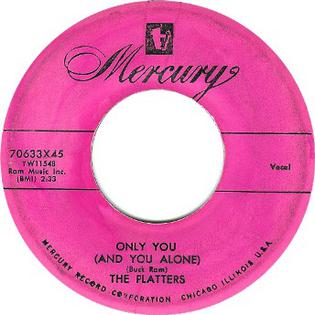
"Only You (And You Alone)" (often shortened to "Only You") is a pop song composed by Buck Ram. It was originally recorded by The Platters with lead vocals by Tony Williams in 1955.

Greatest Hits is the eleventh official album release for English musician Elton John, and the first compilation. Released in November 1974, it spans the years 1970 to 1974, compiling ten of John's singles, with one track variation for releases in North America and for Europe and Australia. It topped the album chart in both the United States and the United Kingdom, staying at number one for ten consecutive weeks in the former nation and eleven weeks in the latter. In Canada, it was number one for 13 weeks between December 14, 1974, and March 22, 1975, missing only December 28, 1974, at number 2 to Jim Croce's Photographs & Memories.

"Come Together" is a song by the English rock band the Beatles, written by John Lennon and credited to Lennon–McCartney. The song is the opening track on the band’s 1969 album Abbey Road and was also released as a double A-side single with "Something". The song reached the top of the charts in the United States and Australia, but peaked at No. 4 in the United Kingdom.

The Fray is an American rock band from Denver, Colorado, formed in 2002 by schoolmates Isaac Slade and Joe King. Their debut studio album, How to Save a Life (2005) was released by Epic Records and received quadruple platinum certification by the Recording Industry Association of America (RIAA), as well as platinum in Australia, Canada, New Zealand and the United Kingdom. The album was preceded by their first hit single, "Over My Head ", which peaked in the top ten of the Billboard Hot 100. The band saw their biggest success with its follow-up, "How to Save a Life", which peaked at number three on the chart and became a top five hit in Australia, Canada, Ireland, Italy, Spain, Sweden and the United Kingdom. Furthermore, both songs received Grammy Award nominations for Best Pop Performance by a Duo or Group.

"In the Ghetto" is a 1969 song written by Mac Davis and recorded by Elvis Presley. It was a major hit released in 1969 as a part of Presley's comeback album, and was also available on the single release of "Any Day Now" as the flip side.

"Proud Mary" is a song by American rock band Creedence Clearwater Revival, written by vocalist and lead guitarist John Fogerty. It was released as a single in January 1969 by Fantasy Records and on the band's second studio album, Bayou Country. The song became a major hit in the United States, peaking at No. 2 on the Billboard Hot 100 in March 1969, the first of five singles to peak at No. 2 for the group.

"Leaving on a Jet Plane" is a song written and recorded by American singer-songwriter John Denver in 1966, originally included on his debut demo recording John Denver Sings as "Babe I Hate to Go". He made several copies and gave them out as presents for Christmas of that year. Denver's then producer Milt Okun convinced him to change the title; the song was renamed "Leaving on a Jet Plane" in 1967.
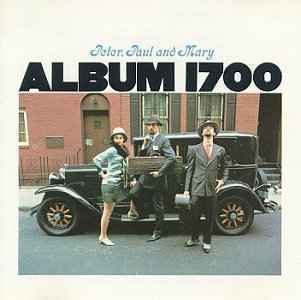
Album 1700 is the seventh studio album by American folk music trio Peter, Paul and Mary, released in 1967. It produced the band's most successful and final hit, a recording of the John Denver song "Leaving on a Jet Plane". The album peaked at number 15 on Billboard magazine's Top LP chart and was nominated for a Grammy Award in the Best Folk Performance category. Album 1700 was so named because its original LP issue was Warner Bros. Records catalog number W-1700 for the mono version and WS-1700 for the stereo version. It stayed on the charts and rose again in 1969, thanks to the single release of "Leaving on a Jet Plane".

"Once a Day" is a song written by Bill Anderson and recorded as the debut single by American country artist Connie Smith. It was produced by Bob Ferguson for her self-titled debut album. The song was released in August 1964, topping the Billboard country music chart for eight weeks between late 1964 and early 1965. It was the first debut single by a female artist to reach number one on the Billboard Hot Country Songs. This song peaked at number one for the week of November 28, 1964, and it stayed at number one for eight consecutive weeks, a record for a female solo artist for nearly 50 years, until it was surpassed by Taylor Swift's "We Are Never Ever Getting Back Together" in December 2012.

"Bennie and the Jets" is a song written by English musician Elton John and songwriter Bernie Taupin, and performed by John. The song first appeared on the Goodbye Yellow Brick Road album in 1973. "Bennie and the Jets" has been one of John's most popular songs and was performed during his appearance at Live Aid.
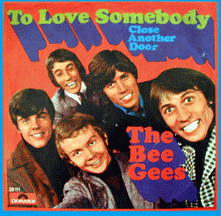
"To Love Somebody" is a song written by Barry and Robin Gibb. Produced by Robert Stigwood, it was the second single released by the Bee Gees from their international debut album, Bee Gees 1st, in 1967. The single reached No. 17 in the United States and No. 41 in the United Kingdom. The song's B-side was "Close Another Door". The single was reissued in 1980 on RSO Records with "How Can You Mend a Broken Heart" as its flipside. The song ranked at number 94 on NME magazine's "100 Best Tracks of the Sixties". It was a minor hit in the UK and France. It reached the top 20 in the US. It reached the top 10 in Canada.
"(Now and Then There's) A Fool Such as I" is a popular song written by Bill Trader and published in 1952. Recorded as a single by Hank Snow it peaked at number four on the US country charts early in 1953.
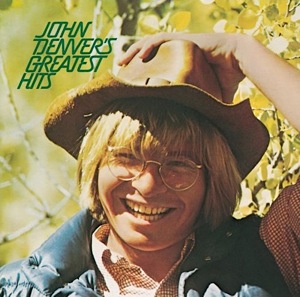
John Denver's Greatest Hits is the first greatest hits album by American singer-songwriter John Denver, released in November 1973 by RCA Records. A version known as The Best of John Denver with the same track listing was released in some countries.

"Everyday" is a song written by Buddy Holly and Norman Petty, recorded by Buddy Holly and the Crickets on May 29, 1957, and released on September 20, 1957, as the B-side of "Peggy Sue". The single went to number three on the Billboard Hot 100 chart in 1957. "Everyday" is ranked number 238 on Rolling Stone magazine's list of the "500 Greatest Songs of All Time".
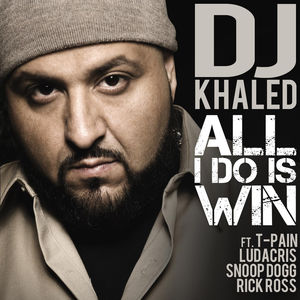
"All I Do Is Win" is a song from DJ Khaled's fourth studio album Victory (2010). It was the third single from the album. The track features American rappers T-Pain, Ludacris, Snoop Dogg and Rick Ross. It was released on February 8, 2010, along with "Put Your Hands Up". The song peaked at number 24 on the US Billboard Hot 100 chart. The single was certified triple platinum by the Recording Industry Association of America (RIAA).

Charles Edgar Walker Hayes is an American country pop singer and songwriter. He has released three studio albums: Reason to Rhyme in 2011 on Capitol Records Nashville, and Boom and Country Stuff the Album in 2017 and 2022 on Monument Records. Hayes has charted multiple singles on the Billboard Hot Country Songs and Country Airplay charts; his highest-peaking is "Fancy Like", which reached the number one position on both charts between late 2021 and early 2022.
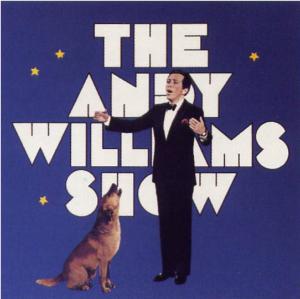
The Andy Williams Show is the twenty-sixth studio album by American pop singer Andy Williams that was released in the fall of 1970 by Columbia Records. In his review on AllMusic.com, William Ruhlmann writes that "The Andy Williams Show LP was not a soundtrack recording from the TV series, and it was not really a live album, although it gets categorized as such. What appears to be the case is that Columbia Records took a group of Williams' studio recordings, most of them made during the summer of 1970 and consisting of his versions of recent soft rock hits, and added a lot of canned applause along with some of the kind of musical interludes used to usher numbers on and off on the show, including bits of its "Moon River" theme music at the start and the finish."



















